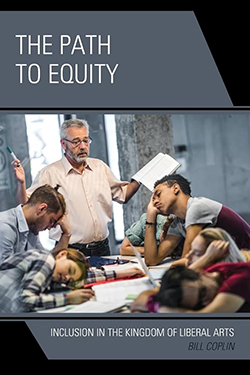The Path to Equity: Inclusion in the Kingdom of Liberal Arts
Bill Coplin
Rowman & Littlefield, July 2023

Bill Coplin, professor of policy studies, has written “The Path to Equity: Inclusion in the Kingdom of Liberal Arts” (Rowman & Littlefield, 2023).
In the book, Coplin argues that the approach to liberal arts education that prioritizes academic scholarship and learning for its own sake does not fully equip students with the practical, career-oriented skills for which many people enter college. This mismatch is partly based in university elitism and can lead to student anxiety, drop out or dissatisfaction, he says. Coplin notes that progress has been made and recommends institutional changes that offer more career exploration, experiential learning and real-world experience to succeed in the workforce.
Coplin has published over 115 books and articles in international relations, public policy and education and community service. His previous books include “The Happy Professor: How to Teach Undergraduates and Feel Good About It” (Rowan & Littlefield, 2019), “Public Policy Skills in Action: A Pragmatic Approach” (Rowan & Littlefield, 2017) and “SkillsWin! A Playbook for Career Success” (Sogna Entertainment Ltd., 2013).
Coplin is the founder of Maxwell’s Policy Studies Undergraduate Program, which marked its 45th anniversary in 2022. His specialties include higher education, public policy analysis and citizenship and urban education. He received a Ph.D. from American University in 1964.
From the Publisher:
Coplin has been saving students from the damage done by the bait and switch business model of the liberal arts programs for fifty years. The bait promises career preparation and the switch is to teach undergraduates how to be scholars. He demonstrates how the Kingdom of Liberals Arts programs are based on an elitist attitude that is harmful to most undergraduates who value career preparation over love of learning. This elitism leads to increased anxiety for college students and a college completion rate lower than the worst high schools in the U.S.
He shows how the elitism does not serve equity and inclusion but does the opposite. He demonstrates that the harm is not just confined to undergraduate education but to many socio-economic conditions in American society. The Kingdom has contributed to a K-12 education system that sends too many students to college and prevents the resources needed for careers without a college education. It shares some of the blame for the lack of skill and semi-skilled labor in this country.
Coplin ends on a positive note by showing that some progress in transforming the Kingdom to an institution that serves its undergraduates has occurred but much more needs to be done. He suggests three most important structural changes need to quicken the pace of change and contribute to, rather than prevent, equity and inclusion.
Related News
Commentary

Dec 3, 2025
Commentary

Dec 2, 2025

